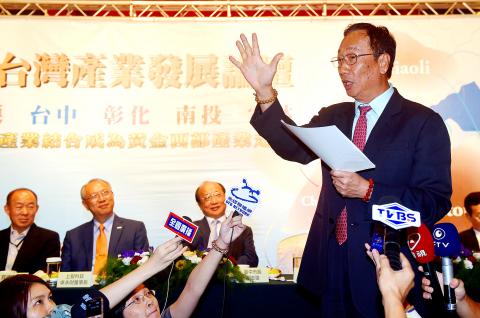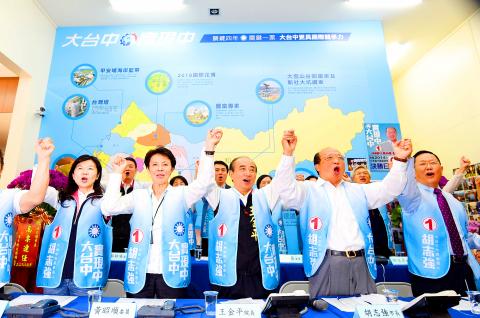Foxconn Technology Group chairman Terry Gou (郭台銘) came under fire yesterday for saying on Monday that he would “invest more” in Greater Taichung if Taichung Mayor Jason Hu (胡志強) of the Chinese Nationalist Party (KMT) is re-elected, drawing criticism from Democratic Progressive Party (DPP) Chairperson Tsai Ing-wen (蔡英文) and student activist Chen Wei-ting (陳為廷).
Tsai criticized what she called the business tycoon’s overly intimate relationship with the KMT on Facebook yesterday, saying that for Taiwan’s economy to experience vibrant and robust development, the economic environment should be distanced from political “colors,” because a political party interacting too closely with big corporations would engender a hotbed of corruption.
“Corporations getting too involved in electoral campaigns would also raise suspicion that they have engaged in quid pro quo dealings with a certain party,” she added.

Photo: Liao Chen-huei, Taipei Times
Tsai said that if an entrepreneur cares about the Taiwan’s future, “he would not pull investments from the nation simply because the ruling party changes,” adding that if this entrepreneur cares about improving people’s lives “he would start with the people in his own company by taking care of his employees, protecting the environment and helping vulnerable groups, rather than intervening in elections.”
Chen focused his criticism on the promise of a NT$200 billion (US$6.47 billion) investment Gou made while stumping for Hu in Taichung.
The student leader, who cofounded activist group Taiwan March after helping spearhead the Sunflower movement, snubbed the offer yesterday on Facebook, saying the businessman had made similar promises in previous elections that had gone unfulfilled.

Photo: Liao Yao-tung, Taipei Times
From 2002 to 2010, Gou made seven such promises during electoral campaigns that have yielded little results, Chen said, citing a chart compiled by a Chinese netizen to warn others in China against Gou’s investment plans.
“It’s such an embarrassment that a Chinese person used examples from Taiwan to caution other Chinese against Gou,” Chen wrote.
The activist said that because it only goes up to 2010, the chart probably only shows part of Gou’s unfulfilled promises, because within the past four years, the tycoon must have made more such offers.
“The most famous example of these pledges is the one he made regarding Miaoli County’s Dapu Borough (大埔). Miaoli County Commissioner Liu Cheng-hung (劉政鴻) used Gou’s plan to carry out factory expansions as an excuse to support the county government’s land expropriation. Now, with the land expropriated, rice fields destroyed and a person dead, Gou has said that no factory will be built after all,” Chen said, referring to Chang Sen-wen (張森文), who died after his home was bulldozed last year.
He added that it would not mean much if the businessman did follow through on his promises, because as “a lot of people have already pointed out when Gou threatened to leave Taiwan days ago, Gou has been enjoying subsidies and tax exemptions in Taiwan, although most of his production lines are in China. He offers less than 5,000 job opportunities in Taiwan, which is proportionally not on par with the nation’s small and medium enterprises.”
In a separate incident, DPP Taichung mayoral candidate Lin Chia-lung (林佳龍) accused Hu of siding with big business, to which the incumber yesterday replied: “The public know who is close to the corporations.”
Hu said that when Gou had asked people to not force Foxconn out of Taiwan, he had immediately thought of Taichung, stressing that politics should not hurt the economy, but the economy should not take the lead in politics either.
Additional reporting by Su Chin-feng

ANOTHER EMERGES: The CWA yesterday said this year’s fourth storm of the typhoon season had formed in the South China Sea, but was not expected to affect Taiwan Tropical Storm Gaemi has intensified slightly as it heads toward Taiwan, where it is expected to affect the country in the coming days, the Central Weather Administration (CWA) said yesterday. As of 8am yesterday, the 120km-radius storm was 800km southeast of Oluanpi (鵝鑾鼻), Taiwan’s southernmost tip, moving at 9kph northwest, the agency said. A sea warning for Gaemi could be issued tonight at the earliest, it said, adding that the storm is projected to be closest to Taiwan on Wednesday or Thursday. Gaemi’s potential effect on Taiwan remains unclear, as that would depend on its direction, radius and intensity, forecasters said. Former Weather Forecast

As COVID-19 cases in Japan have been increasing for 10 consecutive weeks, people should get vaccinated before visiting the nation, the Centers for Disease Control (CDC) said. The centers reported 773 hospitalizations and 124 deaths related to COVID-19 in Taiwan last week. CDC Epidemic Intelligence Center Director Guo Hung-wei (郭宏偉) on Tuesday said the number of weekly COVID-19 cases reported in Japan has been increasing since mid-May and surpassed 55,000 cases from July 8 to July 14. The average number of COVID-19 patients at Japan’s healthcare facilities that week was also 1.39 times that of the week before and KP.3 is the dominant

The Chinese Communist Party’s (CCP) working group for Taiwan-related policies is likely to be upgraded to a committee-level body, a report commissioned by the Mainland Affairs Council (MAC) said. As Chinese President Xi Jinping (習近平) is increasingly likely to upgrade the CCP’s Central Leading Group for Taiwan Affairs, Taiwanese authorities should prepare by researching Xi and the CCP, the report said. At the third plenary session of the 20th Central Committee of the CCP, which ended on Thursday last week, the party set a target of 2029 for the completion of some tasks, meaning that Xi is likely preparing to

US-CHINA TRADE DISPUTE: Despite Beijing’s offer of preferential treatment, the lure of China has dimmed as Taiwanese and international investors move out Japan and the US have become the favored destinations for Taiwanese graduates as China’s attraction has waned over the years, the Ministry of Labor said. According to the ministry’s latest income and employment advisory published this month, 3,215 Taiwanese university graduates from the class of 2020 went to Japan, surpassing for the first time the 2,881 graduates who went to China. A total of 2,300 graduates from the class of 2021 went to the US, compared with the 2,262 who went to China, the document showed. The trend continued for the class of 2023, of whom 1,460 went to Japan, 1,334 went to